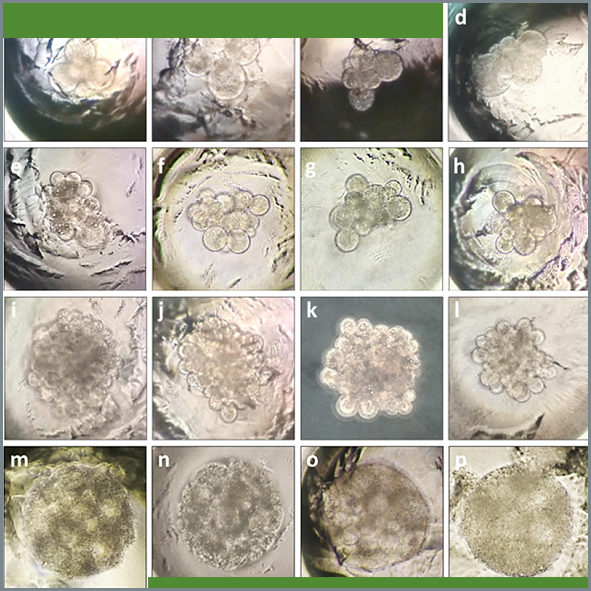Effect of resveratrol on the <em>in vitro</em> maturation of ovine (<em>Ovis aries</em>) oocytes and the subsequent development of handmade cloned embryos
Contenido principal del artículo
Resumen
The effect of resveratrol on the in vitro maturation (IVM) of ovine (Ovis aries) oocytes and the development of handmade cloned embryos was evaluated. The nuclear maturation and reactive oxygen species (ROS) levels in the oocytes, as well as the early development and morphological cloned embryo quality, were evaluated under different resveratrol concentrations (0, 0.5, 2 and 5 μM). After IVM, no significant difference was observed in the maturation rate of oocytes treated with 0.5 μM (81.3 %) and 2 μM (72 %) resveratrol compared to that of the control group (0 μM) (74.2 %), but the rate significantly decreased at 5 μM (56 %) (p < 0.05). When the oocyte ROS levels were determined, no significant differences among the groups were observed (p > 0.05). For cloned embryo development, the embryos obtained from the oocytes treated with 0.5 μM resveratrol showed higher (p < 0.05) compacted morula rates (10.7 %) compared to the embryos obtained from the oocytes treated with 0, 2 and 5 μM (6.2, 0 and 0 %, respectively). Regarding embryo morphological quality, the embryos from the oocytes treated with 0.5 μM resveratrol showed a lower rate of poor quality morulae (4.7 %) in comparison to those treated with 0, 2 and 5 μM (23.8, 23.3 and 33.3 %, respectively) (p < 0.05). In conclusion, resveratrol showed no significant improvement on the IVM or ROS levels in domestic ovine oocytes. However, treatment with 0.5 μM resveratrol during IVM improved embryo quality and promoted morulae compaction of Ovis aries handmade cloned embryos.
Detalles del artículo
License

Veterinaria México OA por Facultad de Medicina Veterinaria y Zootecnia de la Universidad Nacional Autónoma de México se distribuye bajo una Licencia Creative Commons Atribución 4.0 Internacional.
Basada en una obra en http://www.revistas.unam.mx
- Todos los artículos en Veterinaria México OA se publican bajo una licencia de Creative Commons Reconocimiento 4.0 Unported (CC-BY 4.0). Con esta licencia, los autores retienen el derecho de autor, pero permiten a cualquier usuario compartir, copiar, distribuir, transmitir, adaptar y hacer uso comercial de la obra sin necesidad de proporcionar un permiso adicional, siempre y cuando se otorgue el debido reconocimiento al autor o fuente original.
- Al utilizar esta licencia, los artículos en Veterinaria México OA cubren o exceden todos los requisitos fundacionales e institucionales para ser considerados de Acceso Abierto.
- Los autores no pueden utilizar material protegido por derechos de autor en su artículo a menos que ese material esté también disponible bajo una licencia igualmente generosa.



